
Phoenix area EPICS High students use engineering to change their world
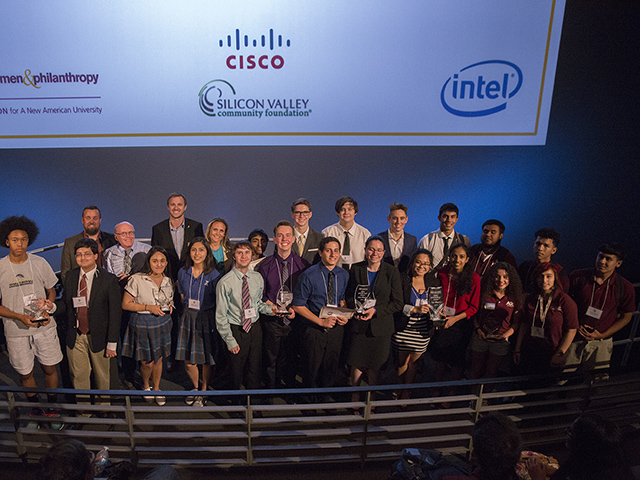
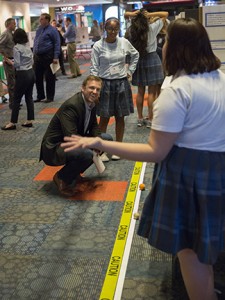
Andrea Muniz Martinez (right) and Karla Alvarado-Lopez from Xavier College Preparatory, explain Solar System Science to EPICS Director Scott Shrake. The project uses Oreo cookies to demonstrate the phases of the moon. Photographer: Pete Zrioka/ASU
Shoes that grow with your feet, access to clean water in remote areas and an app for use at Lowell Observatory were just a few of the imaginative engineering projects presented by local students last week at the ASU EPICS High School Showcase.
EPICS, or Engineering Projects in Community Service, is a design-based, service learning and social entrepreneurship program that incorporates engineering design processes to provide human-centered solutions for today’s real world problems. The high school program is administered by K-12 Engineering Education and Outreach. This was the fifth year for the high school program and the second Showcase event, held at the Arizona Science Center. Sponsors included ASU Women & Philanthropy, CISCO, Silicon Valley Community Foundation and Intel.
“EPICS is a great way to empower students through social entrepreneurship and human centered design” explains Scott Shrake, Director of EPICS at ASU. “Everything our students create has a real impact on a real community. Students love making a positive difference in their communities, and EPICS encourages them to find innovative ways to make that impact.”
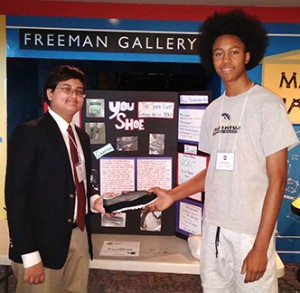
Daniel Noon (left) and Xavier DuSell from Rancho Solano Preparatory show off a shoe that grows with your feet. Teammate Nico Mannion was unable to attend. Photographer: Terry Grant/ASU
Rancho Solano Preparatory eighth graders Xavier DuSell, Nico Mannion and Daniel Noon would like to change the world one pair of shoes at a time. “When kids’ feet grow really fast, some families can’t afford to keep buying new shoes,” explains DuSell. So the trio created You Shoe, an athletic-style shoe that uses stretchable fabric for the upper and moldable plastic pellets, like that used to create mouth guards and craft projects, for the sole. “Once you outgrow the shoes, you just soak them in hot water and the plastic can be molded again,” says DuSell. “After it cools, it’s like a new pair of shoes.” The team took home the EPICS Innovation Award.
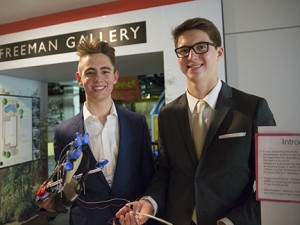
Patrick Schaffer (left) and Matthew Duffy from Highland High School demonstrate Saeboflex, a device that gives rehabilitation feedback for stroke victims. Photographer: Pete Zrioka/ASU
At Highland High School, changing the world is a little more personal. Highland’s EPICS teacher Matt Prater had suffered a stroke and has limited use of his arm and hand. When Prater commented to students that the rehabilitation process lacked feedback about his progress, seniors Matthew Duffy and Patrick Schaffer launched Saeboflex, a device that collects data and details improvement. Their invention took third place in the Internet of Things (IoT) category.
Another personal project at Highland focused on creating a purification system that provides clean, filtered water in areas where it’s unavailable. “One of my students, Elissa Balbas, has family in an area of the Philippines where drinking water is contaminated with run-off from factories and chemical plants,” says Prater. “She and her teammate, Merin Jacob, set out to find a solution.” Their project, Aquafer, won first place overall in the judged competition.
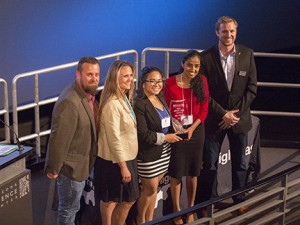
Highland High School student Elissa Balbas (Center) has family in an area of the Philippines with limited access to pure drinking water. She and teammate Merin Jacob responded with Aquafer, which won first place overall in the EPICS showcase. From left: Shane Bycott, K-12 Outreach senior coordinator; Hope Parker K-12 Outreach associate director; Balbas, Jacob, and Scott Shrake, EPICS Director. Photographer: Pete Zrioka/ASU
For Prater, who has seven of his 10 students attending ASU next year, the first-year EPICS program at Highland has been very rewarding. “We’ve tried to emphasize problem solving, and students are most inclined to work through those problems when they are focused on issues they care about,” he explains.
Students from Cesar Chavez High School presented projects that used electronics and robotics. Adam Uddin, Jose Alverado and Tyquan Wimbish created a baby stroller that offers both heating and cooling options. Their creation, which can be operated using a solar panel or a battery, has been donated to Maggie’s Place, a shelter for moms with new babies.
A backpack follower was the creation of Jonathan Fresquez, Cristopher Castillo, Luis Estrada, Toby Holden and Agustin Paz, all planning engineering or computer science careers. “The robotic device is especially valuable for students who can’t carry a heavy pack,” explains Estrada. “We used infrared and ultrasonic sensors so it will follow, but we’re still working on angle and distance processes.” The team hopes the project will be marketable next year.
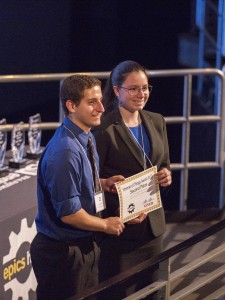
John Gebara, Natalie Krueger and Irish Rendon (not pictured) from Gilbert Classical Academy took home two EPICS Awards for their Lowell Observatory Star Tours app. Photographer: Pete Zrioka/ASU
Taking home two awards for Gilbert Classical Academy were Natalie Krieger, Irish Rendon and John Gebara, who created the Star Tours app in concert with the Lowell Observatory. “Originally, we were developing an app that pertained to all of the telescopes at the Observatory,” explains Krieger. “But ultimately, we focused on The Discovery Channel Telescope,” or DCT, which is about 25 miles away from the main campus. The app enables users to explore the telescope remotely. The app took second place in both the Overall and IoT categories.
Gilbert Classical Academy EPICS Coach Erik Gilman took home an award himself — the Pioneer Award, given in recognition for mentoring six teams during the school’s first year participating in the EPICS program.
“The Arizona Science Center was a wonderful partner for our Showcase event, and our students very much enjoyed the opportunity to visit the CREATE™ space,” says Hope Parker, associate director K-12 Engineering Education and Outreach. EPICS teams have access to the space as part of their participation in the program.
“We saw so many ingenious ideas from the 25 teams that presented this year,” says Parker. “We can’t wait to see what the teams produce next year.”
2016 EPICS Showcase Awards
First Place Overall
Aquifer (water filtration system) — Highland High School
- Elissa Balbas
- Merin Jacob
Second Place Overall
Star Tours (Lowell Observatory app) — Gilbert Classical Academy
- Natalie Krieger
- John Gebara
- Irish Rendon
Third Place Overall
Phoenix Renews Kids Space (Playspace at Rio Salado Park) — Xavier Preparatory Academy
- Karen Carlos
- Alondra Ramos
Innovation Award
You Shoe – Rancho Solano Preparatory Academy
- Daniel Noon
- Nico Mannion
- Xavier DuSell
Community Impact Award
Composting Systems — (Recycle expired cafeteria foods and landscaping materials) — ASU Prep Academy, Downtown
- Javier Davila
- Richard Diaz
- Daniel Flores
- Kimberly Olson
- Daniel Andrade
- Ashley Castro
Internet of Things (IOT) Awards
First: Empath (Biofeedback system for students on the autism spectrum) — Highland High School
- Seth Turnage
- Alex Dolezal
Second: Star Tours (Lowell Observatory App) – Gilbert Classical Academy
- Natalie Krieger
- John Gebara
- Irish Rendon
Third: Sabeoflex (Stroke rehabilitation feedback device) — Highland High School
- Matthew Duffy
- Patrick Schaffer
Pioneer Award:
Erik Gilman — Teacher, Gilbert Classical Academy, with six teams participating in its first year.
Media Contact
Terry Grant, [email protected]
480-727-4089
Ira A. Fulton Schools of Engineering



































